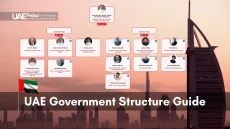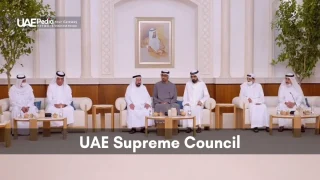The UAE’s political structure is built on the Separation of Powers. This system balances old monarchies with new ways of ruling. The United Arab Emirates, made up of seven emirates, has a special way of ruling UAE Governance.
Here, the leaders, laws, and courts work together. Even though it has monarchies, the UAE also has a system of separation of powers. The Federal Supreme Council is at the top of this system.
UAE Separation of Powers: Constitutional Framework
The United Arab Emirates (UAE) has a special way of sharing power. This system started in 1971. It shows the country’s goal to balance power between the federal government and local areas.
Federal Supreme Council and Executive Leadership
The Federal Supreme Council of UAE’s government. It has the leaders of all seven emirates. They choose the President and Vice-President every five years.
Role of the Federal National Council
The Federal National Council is the UAE’s law-making group. It has 40 members, half elected and half chosen. They help make laws and policies for the country.
Constitutional Distribution of Authority
The UAE Constitution clearly shows who has what power. It balances the power of the federal government and local areas. This helps keep the country united while respecting each area’s special needs.
| Federal Powers | Emirate Powers |
|---|---|
| Foreign Affairs | Local Economic Development |
| Defense | Municipal Services |
| Education | Cultural Affairs |
| Public Health | Law Enforcement |
Federal and Emirate-Level Jurisdictions
The UAE lets local areas make their own decisions. They control their own money and resources. The federal government handles big issues like defense and foreign relations.
This way, the UAE has a flexible and effective government.
Judicial System and Legal Framework
The UAE Judicial System has both federal and local levels. This shows the country’s unique way of governing. At the top is the Federal Supreme Court, the highest court in the UAE. It helps keep laws the same in all emirates.
Read more: Implementing Government Policies in the UAE
Federal Supreme Court Structure
The Federal Supreme Court has a president and judges. They are chosen by the UAE President with the Federal Supreme Council’s approval. Their rulings are final for all lower courts. This ensures federal laws are followed everywhere in the UAE.
Local Judicial Authorities
Abu Dhabi, Dubai, and Ras Al Khaimah have their own courts. These Local Courts work with the federal system. They handle cases specific to their emirates. This setup balances central control with local handling.
Court Hierarchies and Jurisdictions
The UAE’s court system includes Courts of First Instance, Courts of Appeal, and Courts of Cassation. There are also courts for special cases. The UAE doesn’t use juries. Instead, judges decide cases.
Public Prosecution System
The Public Prosecution office is key in the UAE Judicial System. Prosecutors are chosen by decree. They make sure justice is done according to UAE law. Their independence is vital for fair legal processes.
Independence of the Judiciary
Judicial Independence is very important in the UAE. The constitution says judges must follow the law and their conscience. This ensures fair trials and upholds the rule of law across the UAE.


















